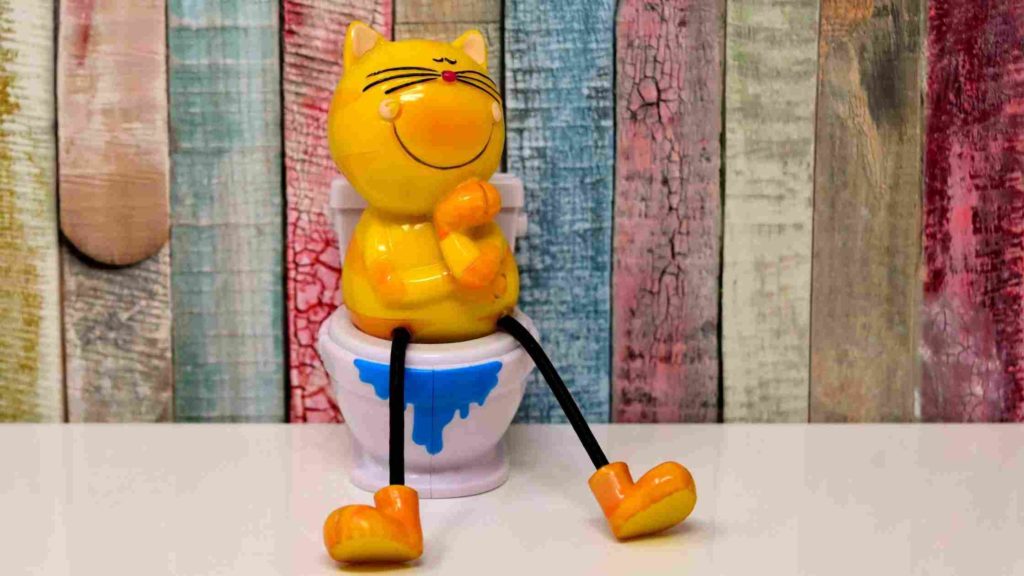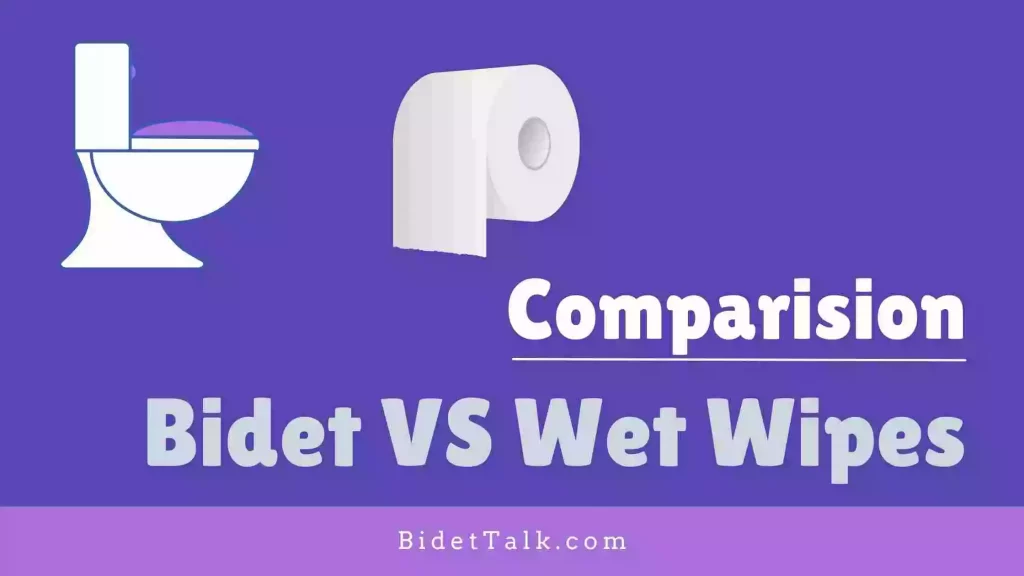Nowadays bidets are becoming more and more popular in US households.
In fact, their demand has increased exponentially after the pandemic toilet paper crisis when all shopping store malls ran out of toilet paper.
I started using bidets in the year 2018.
Before that, I used both wet wipes and toilet paper.
It took me a long me long hard thinking to finally shift to a bidet.
And I am thankful that I did that.
So, If you are someone who is thinking of shifting to bidets or perhaps someone who wants to know the pros and cons of bidets VS wet wipes, then this article will help you make an informed decision.
In this post, I have compiled my knowledge and experience about both, bidet and wet wipes and talked about why I think shifting to a bidet was a great decision.
Before we go into details, here is a table comparing bidet and wet wipes.
| Comparision | Bidet | Wet Wipes |
| Cost | – On average $30 to $40 for a standard model
– $100 for non-electric bidet toilet seats – $250 for Electric bidet toilet seats |
– Regular wet wipes
– Natural wet wipes
|
| Safety | – Hands-free unlike toilet paper – Fairly sanitary as it sits far enough away from the anus and genitals – No harsh chemicals are used in the bidet |
– Generally fairly sanitary and safe – It requires the use of hands to wipe – Contain multiple chemicals because of typically soaked and coated in various additives. |
| Effect on health | – Generally healthy as long as used in moderation – Good for people with hemorrhoids or rashes – Good for maintaining the natural oils necessary for optimal anal health |
– Generally healthy as long as used in moderation
– Can remove good bacteria from the anus or vagina sometimes if used too frequently – Not apt for long term use with synthetic chemicals for cleaning, disinfecting, and fragrances |

What is A Bidet?
A bidet is nothing but a specialized bathroom fixture that washes your butt.
After using the toilet, this is one of the primary ways that many people around the world clean themselves.
Modern bidets are designed in such a way that it sprays a targeted stream of water exactly where you will need it, cleaning up everything gently and easily.
There are several sizes, shapes, and types of bidets.
Obviously, all of them are used for the same purpose: to clean yourself!
What are Wet Wipes?
A wet wipe is a small to medium-sized moistened piece of plastic or cloth, also known as a wet towel or a moist towelette, disposable wipe, disinfecting wipe, or a baby wipe.
We use wet wipes for cleaning purposes like personal hygiene and household cleaning.
A moist wipe will get you cleaner than toilet paper, so it is a good alternative for toilet paper.
Bidet VS Wet Wipes: Pros And Cons
Let us see the benefits of both one by one.
➤ Benefits Of Wet Wipes
Wet wipes are easy to use.
They are very effective with cleaning after a bowel moment.
It seems to be a good alternative if Bidet is not available in the toilet.
Moreover, wet wipes can give you short-term benefits with money.
If you are unable to buy a bidet now, then you can go with wet wipes for sure.
They’re about as effective as a bidet (according to me!), you will save money in the beginning by using wipes.
Yes, I can’t refuse the fact that you’ll spend way moreover a lifetime (thousands perhaps!) by continuing to use paper, but if money is tight right now for you, you may put off getting a bidet for a while.
Disadvantages Of Wet Wipes
● It can cause skin problems like itching, burning sensation, irritation, and rash.
● It causes dehydration to the skin as it removes the natural oils that nourish it and leave it dry.
● A negative impact on the environment because it is not completely degradable
● They can clog the toilet leading to its overflow. It can even clog the sewers.
➤ Benefits Of Bidets
In terms of benefits, I would definitely say that Bidets are most likely to get the first rank in all the other ways for cleaning after using the toilet.
Not only for budget but also for hygiene purposes, bidets are proved to be best for cleaning.
Bidets are super effective if they are used correctly.
Most of us find that a minute-long session is a lot of time for most bowel movements, that is the reason why a lot of electric bidets have a pre-set 1-minute spraying session.
Even if you’re not satisfied with the results after a minute of cleaning (only if you have a particularly messy BM!!), then you can spray for longer.
Bidets are super savers for you in long term.
Let me show you quick math on this.
If you have to go to the toilet 3 times/day (at home) and use 3 squares of wet wipes each time, it’ll cost you $8/month.
Hence, a $30 handheld bidet will pay for itself in just over three months and save you $8 a month going forward. (Not so bad I guess!)
Bidets are way better for plumbing rather than using wet wipes.
It would help you save those extra bucks you are likely to spend on plumbing solutions if you use wet wipes and do not throw them properly in the dustbin.
Bidets are much better for the environment than paper products like Toilet Paper and wet wipes.
You would wonder that a water-consuming device would save water, but don’t forget that 37 gallons of water are used to manufacture a single roll of toilet paper (source: Scientific American)
But the bidets have some disadvantages too. Here is the list.
Disadvantages Of Bidets
● Standalone bidets cover up more bathroom space.
● Bidets may require minor renovations to install.
● Risk of wetting your clothes (if you’re not careful!)
● Can be tricky for first-time users to operate (read the guide before is advisable).
● Uneven nozzles may cause infections in females.
Which Is More Effective? Bidet Or Wet Wipes
I guess after going through the benefits of bidets and wet wipes it would be pretty clear to you that bidet works more effectively either its cleaning, hygiene, or budget.
And with my personal experience too, I find bidets to be way more effective.
Before I had a bidet, I was a heavy wet wipes user! I’d use about 20 squares per wipe and wipe multiple times per visit to the toilet.
But now when I use the bidet, I feel like the water spray cleans my bum in a way that wet wipes never did.
Plus now the number of wipes I use is just 1 or 2 on every toilet visit.
Thus I can confidently say that bidets are way more effective than wet wipes.
Which Is More Environmentally Friendly?
Bidets are much better for the environment than paper products like TP and wet wipes.
As I mentioned in benefits on bidets above, Bidets are a way eco-friendlier than wet wipes.
By comparison, most bidets use about 0.2 gallons/min.
So, if we consider an average person going three at-home bowel movements per day assuming a 1-min session each time, that would be 0.6 gallons per day per person.
So definitely it would be less than the amount of water to be used to make toilet paper.
Some wet wipes are made of synthetic fibers and should require less water for production, but the paper is still a common material in moist wipes—mostly because it allows for labeling as septic-friendly.
Moreover, another big problem with many wet wipes is that they are found in blocked pipes.
Wet wipes are made of plant-based materials (most of the time I guess!), but they’re thick and ultra-durable.
So they don’t dissolve easily.
Wet wipes are frequently advertised as septic-friendly these days but public health sources still recommend that you avoid flushing them.
Wet wipes are made of biodegradable materials, hence why they’re advertised as being flushable. While the plant-based fibers do break down over time, wet wipes are made to be durable.
Wet wipes resist being disentangled making it more difficult for anaerobic bacteria to break down the fibers as they are being thicker and less susceptible to tearing.
An article by Scientific American claims that widespread bidet use would save around 15 million trees per year.
It’s a clear picture for you that Bidets are a much better choice instead of wet wipes when we talk about the environmental aspect.
Bottom line
So, there you go people!
When it comes to both posterior and frontal cleansing, Bidets and wet wipes both beat toilet paper.
According to my experience, choosing a bidet might offer a slight advantage.
Bidets beat wet wipes in measures like cost-effectiveness and sustainability.
The benefits of bidets over wet wipes include equal or greater efficacy, less smearing (potentially better hygiene), lower overall costs in the long term, and better home plumbing.
Finally, bidets are proved more environmentally sustainable by helping save water and trees.



